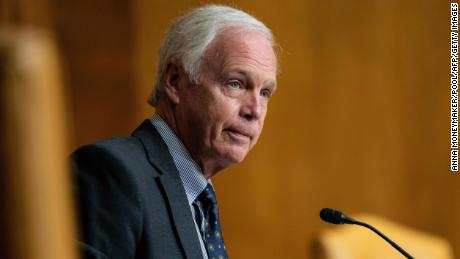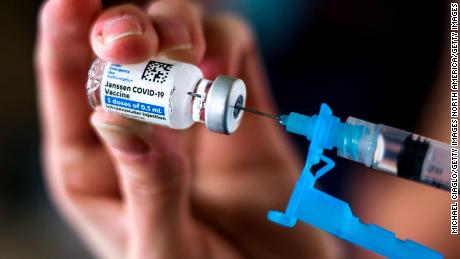But on a recent day at a mass Covid-19 vaccination site at the university in Jackson, Mississippi, getting a shot was a snap. People wanting to be vaccinated just trickled in, and the staff at the site sat bored in the meantime.
“Today it’s quiet, but it hasn’t been like that all the time,” Atehortua said.
At a drive-thru site in Jackson that can handle up to 1,200 appointments in a day, only 275 people had signed up Thursday — and some of those didn’t bother to show up, workers there said.
Experts worry the drop-off suggests a lot of people don’t want the vaccine and fear what’s happening here could jeopardize reaching herd immunity, which doctors say won’t be achieved until at least 70% of population is vaccinated.
Public health officials fight misinformation
Campaigns encouraging vaccination are being overwhelmed by disinformation on social media and elsewhere now that most people who needed and wanted the vaccine have been immunized, public health officials said.
“Miscommunication has been constant since the pandemic started, and that has created distrust in the population,” Atehortua said. “So unfortunately — and this is a reflection that I have made with some colleagues in public health — we are losing the battle of communication.”
JSU, a historically Black university, has an enrollment of close to 7,000 students and 1,100 faculty and staff members. Close to 700 of them have been vaccinated on campus.
False information is what caused JSU student Halle Coleman to delay getting her shots, she told CNN.
“It just felt like everywhere I looked, I was seeing somebody with a new conspiracy theory or just a reason not to get the vaccine,” she said. Some of the conspiracy theories she heard included that the vaccine “was a way for the government to track us, it was a way for the government to inject a new illness into us to make us more sick, to have control over us,” Coleman said.
Mississippi was one of the first states to open Covid-19 vaccinations to everyone 16 and older, but the state is far from having vaccinated everyone who is eligible. About 30% of Mississippians have had their first vaccine dose, while the national average is closer to 40%.
And it’s not just Mississippi that’s lagging. Southern states from South Carolina to Louisiana — excluding Florida — have vaccinated fewer than 59 per 100 people in the states.
And it’s not just the Southern states were vaccination rates are slowing. While the US this week reached the milestone of 200 million doses administered since the first shots were given in December, vaccinations reported by the US Centers for Disease Control and Prevention have slowed from the peak earlier this month of almost 3.4 million shots reported on one day.
This week, on Thursday and Friday, vaccinations were fewer than 3 million for two days in a row, and the seven-day average of new Covid-19 doses reported administered continued to fall. It now is at 2,862,758.
demand for vaccinations has dropped so much that the health district decided to end mass vaccination clinics for first doses and instead, transition to smaller clinics that require fewer resources and volunteers.
Other vaccine providers in the area are reporting the same pattern, according to Kristy Fryman, the emergency response coordinator and public information officer for the Mercer County Health District.
Reaching the ‘hard audiences’
Pharmacies in one part of Louisiana say Covid-19 vaccine demand has “completely fallen off.” Georgia officials announced recently they were shutting down a mass vaccination site due to low demand. Tennessee leaders said late last month they were opening eligibility following low numbers of vaccinations in rural areas. Parts of Texas have also seen declining demand.
“We’re reaching the point where we’re getting to the hard audiences,” said Lori Tremmel Freeman, CEO of the National Association of County and City Health Officials. “The ones that either are unsure or on the fence about the vaccine, don’t have enough information or are just plain outright … not interested in the vaccine for other reasons.”
Part of the problem has been the uncertainty surrounding Johnson & Johnson’s one-shot vaccine. The CDC and the Food and Drug Administration on April 13 recommended pausing use of the vaccine while they investigated the risk of rare, severe blood clots.
Data from the Mississippi Department of Health shows a decrease in vaccinations since late March, and the steepest decline has occurred in the last two weeks. More than 74,000 Covid-19 vaccine appointments remain vacant across the state through mid-May.
voted to recommend resuming its use.
Felicia Kent, director of revenue at Jackson-Hinds Comprehensive Health Center, said when the Johnson & Johnson vaccine was paused, about 80% of people who were scheduled for their second doses showed up at a vaccine site, but “we only had a handful that came out for their first dose.”
“Getting individuals out for the first dose has now become a challenge,” Kent said, so public health officials are reaching out for help from community members.
“What we’re doing now is working with churches, working with community organizations, also working with local barber shops, grocery stores,” to get the word out that the vaccines are safe and that everyone needs to get one.
Dr. Samuel Jones, the director of student health services at JSU, says he gets questions about whether the vaccines will interfere with people’s DNA, and “perhaps am I going to grow an extra toe or finger in the future?”
Jones likes to call it vaccine “inquisitiveness” instead of hesitancy.
“As we as persons who inquire, if we have the right information, perhaps they will, a person will, be armed to make a better decision,” he said.
Many of those people asking him those questions went on to be vaccinated, Jones said.
CNN’s Christina Maxouris contributed to this report.





